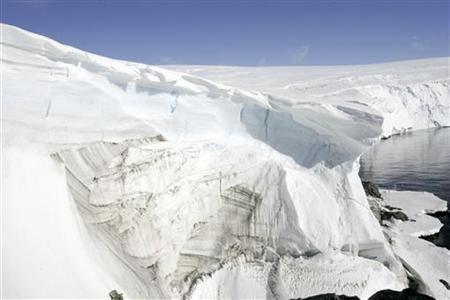Scientists Pin Down Historic Sea Level Rise
Date: 29-Mar-12
Country: UK
Author: Nina Chestney

Ice melt shows through at a cliff face at Landsend on the coast of
Cape Denison in Antarctica December 14, 2009.
Photo: Pauline Askin
The collapse of an ice sheet in Antarctica up to 14,650 years ago might have caused sea levels to rise between 14 and 18 metres (46-60 feet), a study showed on Wednesday, data which could help make more accurate climate change predictions.
The melting of polar ice could contribute to long-term sea level rise, threatening the lives of millions, scientists say.
Sea levels have increased on average about 18 centimetres (7 inches) since 1900 and rapid global warming will accelerate the pace of the increase, experts say, putting coastlines at risk and forcing low-lying cities to build costly sea defenses.
Scientists last month said that thinning glaciers and ice caps were pushing up sea levels by 1.5 millimetres a year, and experts forecast an increase of as much as two metres by 2100.
A very rapid sea level rise is thought to have occurred 14,650 years ago but details about the event have been unclear.
Some past sea level records have suggested glacier melt led to a 20 metre increase in less than 500 years.
But uncertainty lingered about the source of the melt, its force and its link to the changes in climate.
A team of scientists, including researchers from France's Aix-Marseille University and the University of Tokyo, claim to have solved the mystery which may shed light on climate change.
They reconstructed sea level changes by analyzing samples of coral collected from reefs in Tahiti and dated them to determine the extent and timing of the sea level rise.
"Our results ... reveal that the increase in sea level in Tahiti was between 12 and 22 metres, with a most probable value between 14 and 18 metres, establishing a significant meltwater contribution from the southern hemisphere," said the authors of the study published in the journal Nature.
This implies the rate of sea level rise was more than 40 millimetres a year, they said.
A U.N. climate panel on Wednesday said all nations will be vulnerable to the expected increase in heat waves, intense rains, floods and a probably rise in the intensity of droughts.
(Editing by Louise Ireland)
![]()
© Thomson Reuters 2012 All rights reserved